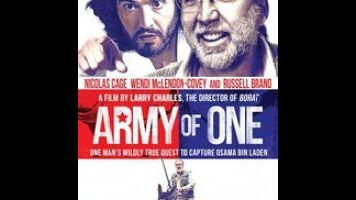Nic Cage goes after Bin Laden in the fitfully funny Army Of One

Well before he starred in a series of low-rent DTV thrillers and memes, Nicolas Cage, now smugly considered an icon of unintentional comedy by so many, used to make mainstream studio comedies pretty regularly. The early ’90s in particular saw a spate of innocuous Cage yukfests (Honeymoon In Vegas, Guarding Tess, Trapped In Paradise), and Army Of One is arguably his first broad comedy since those days, considering the darkness and anguish that run through the likes of Adaptation or The Weather Man. Even this return to outright wackiness finds Cage pretty far afield from his ’90s rom-coms, as he plays real-life crackpot Gary Faulkner, a Colorado man who in the years following 9/11 set off for Pakistan intending to accomplish what the U.S. government couldn’t: capture Osama Bin Laden.
Faulkner’s story has been adapted by director Larry Charles, whose experience directing Sacha Baron Cohen comedies suggests a possible guerilla-comedy approach to match Faulkner’s rogue mission. But Army Of One’s primary concession to docudrama and/or docucomedy is the occasional narration that attempts to provide dry-voiced context for Faulkner’s story. Whether or not this voiceover was actually a Weinstein Brothers mandate (the film is being released by the producers’ genre arm, Dimension), that’s what it feels like: an attempt to patch over the sketchy quality of typical Charles features. But instead of clarifying a thin narrative, the bits of narration only interfere with Cage’s performance, popping in to remind the audience what a strange semi-true story (“maybe elements of truth,” the narration jokingly hedges early on) this all is.
The hedges are a shame, because Cage does typically committed, bizarre, and often weirdly delightful work. Based on footage of the real Gary Faulkner that runs over the end credits, the voice Cage uses—a loudly insistent nasal bray—is his own invention, a welcome return to actorly affectation from one of our best performance stylists. Cage plays Gary as a ponytailed, bearded, polo-shirted sorta-handyman and busybody, with a daft and overbearing (if essentially goodhearted) love for his country. His self-proclaimed expertise is a particularly recognizable strain of middle-aged American maleness. Early in the movie, he hollers at a home-improvement store customer: “I want you to trust me, because I’m probably the only person in this store who will tell you the truth.” Needless to say, Gary is also not an employee of this establishment.
At that same store, Gary runs into Marci Mitchell (Wendi McLendon-Covey), an old high-school crush. They begin a sweet-natured relationship, only somewhat hampered by Gary’s vision of God, played in human form by Russell Brand, insisting that he and he alone has the power to travel to Pakistan and hunt down the elusive Mr. Bin Laden. Gary receives this message in an over-choreographed scene where Brand pops up in various guises all around the hospital room where Gary receives his kidney dialysis treatment. The dialysis sets up a parallel, never directly commented upon but eventually made more explicit, between Gary and Bin Laden, who was rumored for several years to be receiving similar treatment for his kidneys. Gary and Osama are both bearded true believers who refuse to be deterred by their physical limitations.
But the movie doesn’t expand on this idea; mostly, it repeatedly sends Gary to the Middle East as he attempts to find a notorious terrorist with little more than his extremely modest wits and his decidedly immodest samurai sword. Similarly, the movie is armed with little more than Cage and a crazy notion, and like Gary, it gets a lot farther than it probably should. The scenes of Cage’s roadshow buffoonery are often amusing, whether Charles uses his cuts as sharp punctuation, and Cage is an old hand at caricaturing, then humanizing those caricatures. He makes it believable that Gary somehow manages to make friends (and avoid any serious punishment beyond slapstick injury) wherever he goes.
The problem is that Army Of One doesn’t add up to much. It’s not quite a satire nor quite a full character study, and it seems happy to shrug off the mania exhibited by its version of Gary (who almost always wakes up with a start and a scream) because the real-life one has apparently not been diagnosed with any specific mental health problems. There are faint echoes of election-season relevance in an optimistically nutty Cage character who loves his country but doesn’t trust any aspect of the government. (He even gets into a tiff with a Marine that ends in an ill-fated knife-throwing contest.) But it’s his movie, not his elected officials, that ultimately lets Cage’s Gary down.